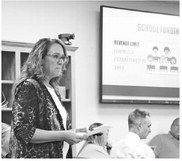Medford School Board approves short-term borrowing plan
Medford Area Public School District is working to reduce the reliance on shortterm borrowing for cash flow purposes, but district finance director Audra Brooks said it may never fully go away.
At Monday’s school board meeting, board members approved $8.5 million in short-term borrowing for the district through Abbybank. Unlike previous years this is taxable borrowing due to the limits on nontaxable borrowing and the amount of the referendum bonds. Brooks said this just created additional layers of paperwork for the district.
The district routinely borrows money for short periods of time throughout the year in order to meet cash flow needs. She explained that a healthy fund balance reduces the need for this serving as a bridge between when tax settlement, open enrollment funds and state aids come in. A large part of the need for the sizable amount of short-term borrowing is due to the Rural Virtual Academy (RVA).
The RVA is funded primarily through open enrollment revenue which does not come in from the state until June of each year. The RVA covers the interest payment for the short term borrowing, totaling about $50,000.
During the finance committee meeting held prior to the regular board meeting, board member John Zuleger asked if the district was successful in building up reserves through the potential to switch to self-insurance, if the district could borrow from its own funds for cash flow instead of going through a bank.
“It is a great thought, but we aren’t there yet,” Brooks replied.
The district will make a decision at a special meeting on October 8 about potentially switching to a self-insurance model. In self-insurance rather than paying an outside insurance company, the district would put premiums into a separate fund and through an outside company pay out claims as they come in. The major advantage is that on good years, the district would be able to retain any savings of premiums versus what is paid out in claims.
Board president Dave Fleegel said he felt it was unlikely that district would allow it to build to the $10 million needed to eliminate the need for short-term borrowing. A more realistic scenario would be allowing the district to keep insurance costs level.
In other business, board members:
• Received an update on the construction projects. The initial phases with work at the middle school has been completed and work is set to begin at the high school. The district has benefitted from bids coming in below budget with the opportunity to expand the work to include a more permanent location for Raider Cafe, a career center and life skills areas of the high school. The district had budgeted $20 million for the work at the high school and the bids came in at $19,131,405.
• Approved as part of the consent agenda, and intergovernmental agreement between Medford Area Public Schools and DC Everest Area School District regarding the location of the Rural Virtual Academy’s space leased in Rothschild.
In a letter dated August 19, 2025, the Department of Public Instruction (DPI) states that somewhat some of RVA’s events and activities at the space included “educational programming” that involved instructional staff, such that it was operating an in-person charter school.
The DPI said that in order for this to take place and meet legal requirements, the two districts would need to have an intergovernmental agreement. The RVA has had a presence in the greater-Wausau area for many years moving from their previous location in Mosinee to the Rothschild location near the Cedar Creek Mall to provide centralized services to RVA students in that area. Under the agreement, D.C. Everest may join the consortium of schools that operates the RVA as an invested member in the 20262027 school year. The agreement meets the requirements of the DPI.


